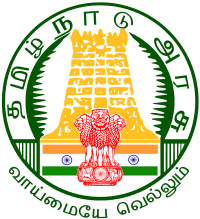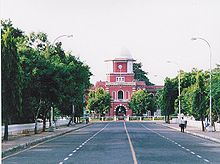Education in Tamil Nadu
 | |
| Government of Tamil Nadu | |
|---|---|
| Department of School Education (Tamil Nadu), Department of Higher Education (Tamil Nadu), | Department of Employment and Training (Commissionerate of Employment and Training) |
| General details | |
| Primary languages | Tamil, English |
| System type | state |
| Enrollment (2010) | |
| Total | 12855485 |
| Primary | 9797264 |
| Secondary | 1873989 |
| Post secondary | 1184232 |

Tamil Nadu is one of the most literate states in India.[1] The state's literacy rate is 80.33% in 2011,[2] which is above the national average. A survey conducted by the Industry body Assocham ranks Tamil Nadu top among Indian states with about 100% Gross Enrollment Ratio (GER) in primary and upper primary education.[3]
Education Administration or Authority
- Tamil Nadu Government
- Union Government
School education
The structure of education in the state is based on the national level pattern with 12 years of schooling (10+2+3), consisting of eight years of elementary education, that is, five years of primary and three years of middle school education for the age groups of 6-11 and 11–14 years, respectively, followed by secondary and higher Secondary education of two years each besides two years of pre-primary education. The entry age in class 1 is 5+. Pre-primary classes form age group 3 to 4. The higher secondary school certificate enables pupils to pursue studies either in universities or in colleges for higher education in general academic streams and in technical and professional courses.
Enrollment
There were a total of 12855485 children enrolled across the state as of 2010, with the split up of 9797264 students in primary, 1873989 in secondary and 1184232 in higher secondary classrooms.[4]
Tamil Nadu Board of Secondary Education
Tamil Nadu Board of Secondary Education, established in 1910, is under the purview of the Department of Education, Government of Tamil Nadu, India.The Tamil Nadu State Board of School Examination evaluates students' progress by conducting two board examinations-one at the end of class 10 and the other at the end of class 12. The scores from the class 12 board examinations are used by universities to determine eligibility and as a cut-off for admissions into their programmes.
Medium of instruction
Common:
- Tamil & English - are Common Medium Languages. Most private schools medium of instruction is English while the government run schools are primarily Tamil medium.
Peculiar Cases:
- The Kendriya Vidyalaya's run by the central government have a dual medium of instruction - English and Hindi.
Accreditation
All recognized schools belong to one of the following accreditation systems:
- Central Board of Secondary Education - for all years of study
- Tamil Nadu State Board - for all years of study
- Indian Certificate of Secondary Education - for all years of study
- Matriculation System for classes K - 10 and automatically rolled over to Tamil Nadu State Board for classes 11 and 12.
- Tamil Nadu Anglo-Indian School Leaving Certificate for classes K - 10 and automatically rolled over to Tamil Nadu State Board for classes 11 and 12.
Exceptions to the above rule include a few schools that follow the Montessori method, International Baccalaureate, IGCSE or the American system.
Directorates
The Minister of Education, who is a member of the state legislature, is in overall charge of education in the state. The following Directorates implement those education aspects which are under the control of the School Education Department.[5]
- Directorate of Elementary Education
- State Project Directorate, District Primary Education Programme and SSA
- Directorate of School Education
- Directorate of Matriculation Schools
- Directorate of Government Examination
- Directorate of Teacher Education, Research and Training
- Directorate of Non-formal and Adult Education
- Directorate of Public Libraries
- Teachers Recruitment Board
- Tamil Nadu Text-book Corporation[5]
Government of Tamil Nadu's schemes
Some of the schemes introduced by the Tamil Nadu government in school education are[6]
- Mid-day Meal Scheme
- Early Childhood Care and Education (ECCE)
- Girls education
- Computer education
- Integrated Education for the Disabled (IED)
- National Programme of Education for Girls at Elementary Level (NPEGEL)
- Kasturba Gandhi Ballka Vidyalaya (KGBV)
- Educational satellite (EDUSAT)
- Distribution of free text books
- Distribution of free uniforms
- Distribution of free bus pass
Intermediate education
- ITI Certificate (Industrial Training Institute) - Regulated by Department of Employment and Training (Commissionerate of Employment and Training) and National Council for Vocational Training
Higher education
Tamil Nadu has 37 universities,[7] 552 (in 2014) engineering colleges. and 1150 arts college, 2550 schools and 5000 hospitals. Tamil Nadu Directorate Of Technical Education (TNDTE) under the control of the Tamil Nadu Higher Education Department deals with Diploma, Post Diploma, Degree, Post Graduate courses and Research programmes. It also regulates the establishment of technical institutions including commerce institutions such as Typewriting, Shorthand and Accountancy.
Universities

Two types of universities in Tamil Nadu are,
- Public University or Government University. It is run by State Governments of Union of India or Government of Union of India
- Private University or Deemed University.
See also
- Tamil Nadu
- Education in Chennai
- Education in India
- Education in Kerala
- List of Tamil Nadu Government's Educational Institutions
- Tamilnadu government colleges
- Tamil Nadu Higher Education Department
- Tamil Nadu School Department
References
- ^ TNN, 14 May 2003, 07.29pm IST (14 May 2003). "Tamil Nadu India's most literate state". The Times of India group. Retrieved 18 July 2010.
{{cite news}}: CS1 maint: multiple names: authors list (link) CS1 maint: numeric names: authors list (link) - ^ "Literacy Rate of Tamilnadu". Census of India 2011.
- ^ "Tamil Nadu's boasts of best school enrollment figures". indiaedunews.net.
- ^ "Number of Students". Data.gov.in. Open Data Initiative of India. Retrieved 22 April 2015.
- ^ a b "School Education". TN Government.
- ^ "Schemes of Govt.of TN" (PDF). Govt.of Tamilnadu.
- ^ Universities in Tamil Nadu.
